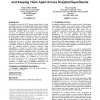Free Online Productivity Tools
i2Speak
i2Symbol
i2OCR
iTex2Img
iWeb2Print
iWeb2Shot
i2Type
iPdf2Split
iPdf2Merge
i2Bopomofo
i2Arabic
i2Style
i2Image
i2PDF
iLatex2Rtf
Sci2ools
199
click to vote
GROUP
2010
ACM
2010
ACM
Coordination by avoidance: bringing things together and keeping them apart across hospital departments
Coordination is central in CSCW systems design, where it is often considered as a process of bringing artifacts and activities together and making them part of a larger system. In this paper, we argue that existing conceptualizations of coordination in CSCW can be successfully extended with the notion of coordination by avoidance. We introduce this notion to describe particular coordination mechanisms whereby actors avoid routines or routes of actions when it conflicts with those of other actors. In a study of pre-diagnostic work, we found that actors coordinate by avoidance when they realize alternative routes of action or that a routine has to be set to a halt to ensure that practices stay coordinated. Routines in diagnostic work are for instance the rescheduling of patients and requesting of relevant patient records that are mundane practices, however, necessary when responsibility is shared or shifts between various actors collaborating to diagnose a patient. Thus, the contributio...
| Added | 11 Feb 2011 |
| Updated | 11 Feb 2011 |
| Type | Journal |
| Year | 2010 |
| Where | GROUP |
| Authors | Naja Holten Møller, Paul Dourish |
Comments (0)

